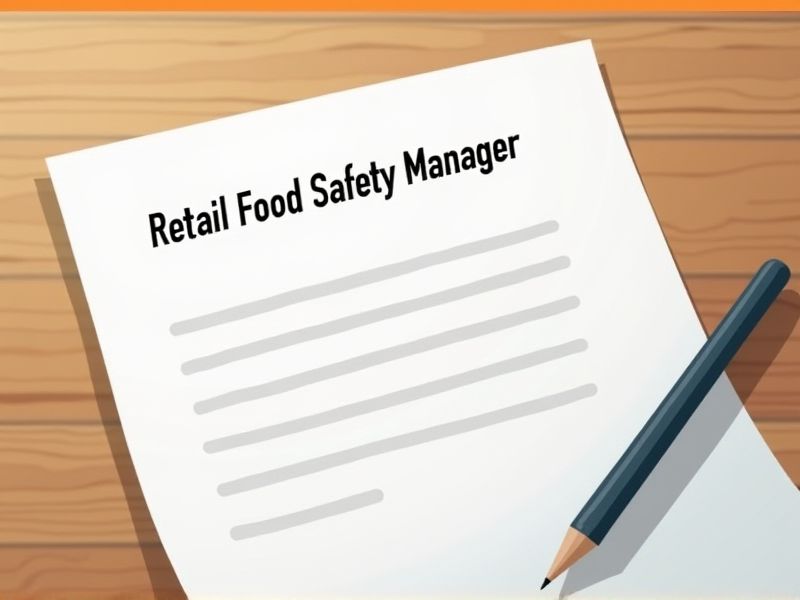
The role of a Retail Food Safety Manager involves ensuring compliance with food safety regulations, reducing the risk of foodborne illnesses, and maintaining high hygiene standards in retail settings. Possessing certifications demonstrates a professional's commitment to mastering industry best practices and staying updated on evolving safety protocols. Certifications also provide credibility and trust to both employers and consumers, ensuring that food handling processes are thorough and effective. Here are some essential certifications you might require as a Retail Food Safety Manager.
ServSafe Food Protection Manager Certification
The ServSafe Food Protection Manager Certification ensures that managers are knowledgeable about food safety protocols, reducing the risk of foodborne illnesses. Certification demonstrates a manager's ability to implement safety practices, which is crucial for maintaining public health standards. It also fulfills regulatory requirements that many local health departments mandate for food establishments. Being certified can enhance a manager's credibility, potentially leading to improved customer trust and business reputation.
HACCP Certification
HACCP Certification ensures that a Retail Food Safety Manager understands the critical control points within food production, significantly reducing the likelihood of foodborne illnesses. By implementing HACCP standards, retail operations can maintain compliance with health regulations, avoiding costly penalties and enhancing consumer trust. Managers with this certification are equipped to train staff more effectively, resulting in more consistent adherence to safety protocols. The certification also provides a competitive advantage, as it demonstrates commitment to high safety standards in the food service industry.
FSPCA Preventive Controls Certification
The FSPCA Preventive Controls Certification is essential for a Retail Food Safety Manager because it provides a comprehensive understanding of the Food Safety Modernization Act (FSMA) regulations, which are crucial for ensuring compliance. This certification educates managers on identifying and mitigating potential hazards in food processes, thus reducing the risk of foodborne illnesses. By obtaining this certification, managers enhance their capability to develop and maintain robust food safety plans that align with federal standards. Certification often increases a manager's credibility and efficacy when implementing safety protocols within their organization.
National Registry Food Safety Manager Certification
The National Registry Food Safety Manager Certification establishes industry-recognized standards for food safety, ensuring that managers understand critical safety protocols. This certification minimizes the risk of foodborne illnesses through evidence-based guidelines. It also aligns managers with regulatory compliance, avoiding potential legal repercussions. Training through this certification enhances operational efficiency by equipping managers with the skills to manage food safety effectively.
Global Food Safety Initiative (GFSI) Certification
Achieving GFSI Certification ensures that a Retail Food Safety Manager adheres to globally recognized standards, enhancing the credibility and trustworthiness of their food safety practices. This certification demands robust risk management systems, which minimize the likelihood of foodborne illnesses by addressing critical control points. By aligning with GFSI standards, there's increased operational efficiency due to streamlined procedures and protocols. The certification also facilitates easier market access, as many retailers and suppliers prefer or require GFSI-certified partners to ensure food safety consistency.
ISO 22000 Lead Implementer Certification
Having an ISO 22000 Lead Implementer Certification provides a Retail Food Safety Manager with a comprehensive understanding of food safety management systems, ensuring compliance with international standards. The certification enhances risk assessment skills, which are crucial in identifying and mitigating potential hazards in the food supply chain. It also demonstrates the manager's commitment to continuous improvement and best practices in food safety. Possessing this certification can enhance trust and credibility among stakeholders, including consumers and regulatory bodies.
Certified HACCP Auditor
A Certified HACCP Auditor is essential for a Retail Food Safety Manager because they ensure that all food safety processes adhere to established HACCP principles and standards, minimizing the risk of foodborne illnesses. Their expertise allows for the accurate identification and analysis of potential hazards in food production and retail environments. With this certification, they can effectively implement corrective actions to address any deviations from critical controls. The auditor's role contributes significantly to maintaining consumer trust and compliance with regulatory requirements.
Safe Quality Food (SQF) Practitioner Certification
The SQF Practitioner Certification equips Retail Food Safety Managers with extensive knowledge of food safety regulations, enhancing their ability to prevent contamination. This certification ensures that managers can effectively implement and maintain safety programs that align with global food safety standards. With the certification, managers are better prepared to conduct risk assessments, which can mitigate potential hazards in the food supply chain. As a result, the certification can lead to improved consumer trust and prevent costly recalls due to compliance failures.
Allergen Awareness and Management Certification
Allergen Awareness and Management Certification equips Retail Food Safety Managers with essential knowledge to prevent allergen cross-contact, protecting sensitive consumers. Failure to properly manage allergens can result in severe allergic reactions, compromising customer safety and business reputation. Certification provides managers with up-to-date guidelines and practices, ensuring compliance with regulatory requirements. Inadequate allergen management can lead to costly legal implications and potential business closure.
Foodborne Illness Prevention Certification
Retail food safety managers with Foodborne Illness Prevention Certification help reduce the incidence of contaminated food reaching consumers, minimizing health risks. Certification ensures managers are well-versed in health regulations and sanitation protocols, promoting compliance with local food safety laws. Trained managers can effectively identify potential hazards in food handling processes, reducing potential for outbreaks. Certified managers enhance consumer trust in the establishment, leading to improved business reputation and increased customer loyalty.
Summary
When you, as a Retail Food Safety Manager, obtain certifications, you enhance your expertise in food safety protocols. This newfound knowledge can reduce the likelihood of health violations and improve inspection outcomes. Certified managers also tend to experience increased trust and credibility from both staff and customers. Such recognition often leads to improved operational efficiency and customer satisfaction.
